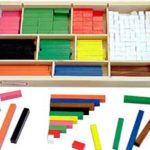Cuisenaire® Rods Compare Length
Over the winter break from my teaching job, I spent quite a bit of time cleaning and organizing our Child Development laboratory. We really dug deep, opening boxes that had never been opened and discovering materials that had never been used. In our excavations, I found a brand new set of Cuisenaire® Rods, complete with a beautiful wooden storage box. Glorious!
There are few manipulatives out there that are as interesting and beautiful as a wooden set of Cuisenaire® Rods. Developed 75 years ago by Belgian teacher Georges Cuisenaire these “rods” come in beautiful colors in varying lengths.
Using Cuisenaire® Rods to compare length is as simple as putting shorter rods next to longer rods and seeing how your children observe those differences. Although these manipulatives were designed for a very specific purpose (units of 1, 2, 3, etc.) I think it is far more likely that children will explore the rods by laying them out, standing them up, and comparing them.
Most young children will be able to identify which rods are shorter and which are longer, especially when they are laid out next to each other. It is far more difficult for children to compare several rods of differing lengths simultaneously. Putting many of them in order from shortest to longest is really challenging because it asks children to think about 2 things at the same time; which rod is shorter than these – but longer than the others?
If you look carefully at the above photo, you can see that the units of 1 are white and the units of 2 are red, 3 are green and so on. They provide a visual representation of number units, up to 10, or for today’s purposes shortest to longest.
